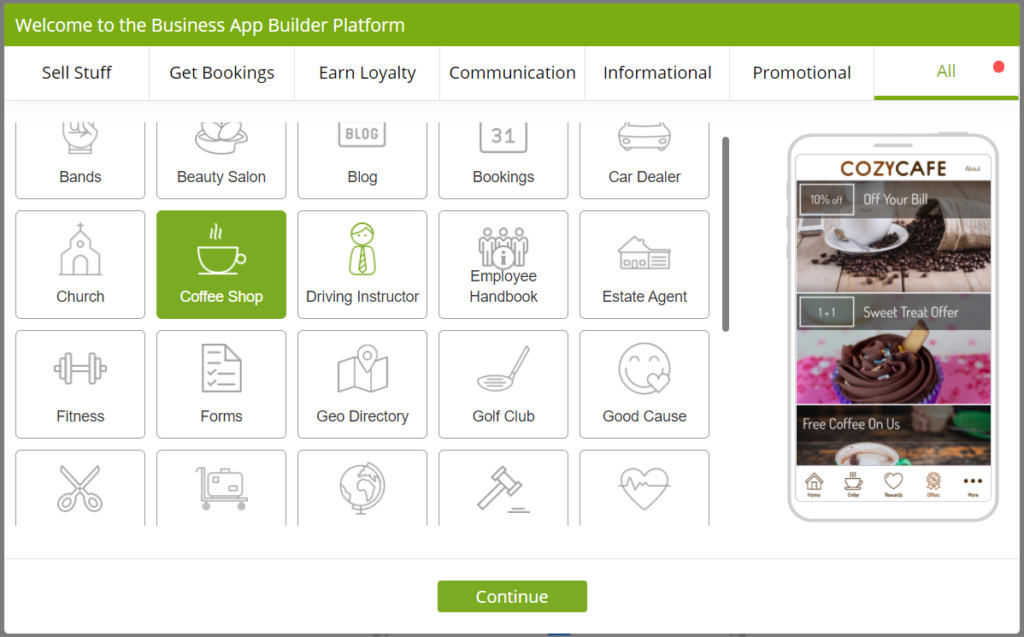To create a mobile app without coding, you need to use an app builder. These are tools that come with pre-programmed templates and features that you can edit and customize.
Because the features in app builders are pre-made, you don’t need to program them yourself. And because you can customize the look, content, and features, you can build mobile apps that are entirely your own.
AppInstitute is one of the most popular app builders. We have designed the mobile app development process to be as straightforward as possible. We believe you will be able to build an app that wows your customers, no matter your level of technical ability.
Our mobile apps are perfect for small businesses that want an app to improve their service and compete with bigger brands.
Our customers currently include:
- Restaurants that use their mobile apps to enable contactless ordering, takeaway, and delivery.
- Coffee shops that use their app for loyalty schemes or order in advance.
- Hair salons use the app to manage bookings and loyalty schemes.
- Radio stations provide listeners with an easy-access radio stream.
- And more.
You can quickly build both an iOS and an Android app with the app maker. This is essential, as releasing native apps on each platform ensures your entire customer base can use your product.
If you want to make an app while reading this guide, head over to this link to sign up and try out our app builder.
Step One: Choose Your Template
The first step in the app development process is choosing a template. We have templates available for a wide variety of business types, industries, and use cases.

Each of these templates contains the features that most benefit the people who run each type of business.
For example:
All the templates are customizable. That means if it doesn’t have all the features you want, you can easily add more in the following steps.
If your business doesn’t fit any of the existing templates, you can make an app from scratch and only add the pages and features you need. Just choose the relevant option when setting up.
Step Two: Branding
Next, select a color scheme for your template. We make this easy by letting you connect your website to the app builder. We then pull out the colors you already use and suggest a suitable palette for your app that matches your existing branding.
If you don’t have a website or you’d rather choose your colors, you can do so in the next step. Just click the “Skip this step” button.
At this stage, you can enter your mobile number so we can send you a preview link that lets you see how the app looks on a mobile device.

The colors you choose aren’t the only way you can brand your app. Our app builder makes it easy for you to customize your app with images that you can use on the splash screen or as a header bar image.
This makes your app instantly recognizable. Just upload the images via the relevant section.
The final step in the branding process is uploading your app icon. This is the logo that people see when they want to open your app or search for it on the App Store or Google Play. Make sure yours stands out and is instantly recognizable so people can quickly access your app.
Step Three: Content
Each app template comes with preloaded content, which you can easily edit to suit your own business. For example, you can change the text shown on the About page or add new images and descriptions to your menu.
The app builder also makes it easy to add new tabs to your mobile apps.
Whether it’s an about us page with details of your company’s contact and social information, a services page that outlines all you have to offer, loyalty programs, or simple to use forms. You can customize your content to build an app suitable for any business type.

It’s also easy to remove features you don’t think will benefit your audience. If you don’t want to offer a loyalty program, for example, just delete it from the app.
This customization ensures that novices can create mobile apps unique to their business without writing a single line of code.
Once you’ve added content, you can set navigation options. Choose from a tab bar or sidebar menu that enables customers to access features in your app easily.
Setting up the back-end of the features is easy. You can adjust the settings so that you receive a notification when someone makes an order or sends you a message. It’s also possible to restrict access to certain pages to only logged-in users.
Step Four: Publish
Now you’ve worked on the design and added your content to each area of your app, you just need to publish it. Users will then be able to easily download either the iOS or Android app to their phones.
We provide all our users with an easy-to-use wizard that simplifies the publication process. Just follow the steps to set your app live on the App Store, the Google Play Store, or both.
There are several sections you will have to complete before you go live. First, you need to confirm that you don’t breach any of the content warnings from either store. Then you can fill in the details that will show up in your app store listing, including:
- App Title
- Icon Name
- Categories
- Keywords
- Description
Before publishing your app, you’ll need to sign up for a Google and Apple Developers account. This is required by everyone who wants to publish an app on one of these platforms.
















